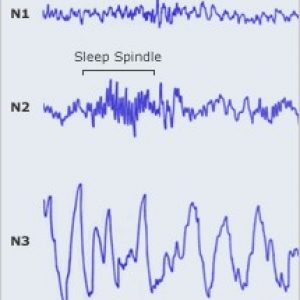
The Importance of Sleep!
By Christine Ferch
The importance of sleep is essential to our ability to function. For some, this activity is the most cherished activity of the day, having the ability to sleep in is the most looked forward to task all week. However, some of us struggle with our sleep and only wish to sleep through the night with no interruptions. Some difficulties lie with falling asleep, staying asleep or being able to fall back asleep if woken up.
Why is it important?
Sleep was once thought to be a time were the brain and body shut off, but through later research, it was demonstrated we have different sleep cycles, further mentioned in detail below, were we are more active when we are asleep than when we are awake. Our bodies require sleep to maintain proper mental and physical functioning, which is important to our overall health, we do not shut off, but rather repair and restore our minds and bodies.
We have two interacting systems in our body, some of you may have heard of our biological clock and the other is the sleep-wake homeostat (homeostasis: the need to find balance within systems). These sleep systems determine our transitions from being awake to sleep, then back to being awake.
There are two types of sleep, the most known is REM, rapid-eye-movement, the second is NREM, nonrapid eye movement. REM is our active sleep, sleep patterns are determined by waves from EEG machines, the waves in REM are small and fast and rapid eye movements or blinking. Some experts believe these eye movements are an individual’s response to what is happening in dreams. Additionally, during REM, our legs and arms are temporarily paralyzed! It is thought, this assists in controlling our ability to carry out what we are dreaming about.
Sleep Cycles
NREM has three different stages: N1, N2, N3, during this progression, our brain waves are slower, and our eyes remain still. Our deepest part of sleep occurs in N3 where EEG shows our waves as large and slow waves and spindles.

When we begin to drift into sleep, we start off in NREM, EEG shows activity associated with wakefulness but then shifts into N1.
The shift from NREM to N1 can occur within seconds or minutes (lucky people), slow eye movements occur as the individuals begins to drift into sleep. N1 can typically last for around 7 minutes before moving into N2, this is shown by sleep spindles as indicated on the graph and lasts anywhere from 10-25 minutes.
When N2 progresses, the wavelength changes right before moving into the third stage, N3. This stage is about 10-40 minutes and shows a slow waves data indicating the individual is in a deep sleep. As NREM moves forward, the brain becomes less responsive to external stimuli and it becomes harder to wake the individual up.
During N3, there are body movements such as twitches, the bodies sign of moving into lighter sleep stages. These stages cycle throughout the night, REM is the only stage which becomes longer throughout the night, N3 occupies less time and may even disappear as the cycle continues through the night.
What affects our sleep?
Many different components in our environment such as temperature and light and what we bring to the table such as our age, amount of recent sleep or being awake, our internal clock, exercise, and stress. Other things which affect sleep are substances, alcohol, and high sugar foods. These factors can impact how we fall asleep, when we fall asleep, how we run through the sleep cycle which impacts how well we feel we slept and how rested we feel both mentally and physically. Biological or medical affects can impact our ability to sleep such as thyroid, hormones, chronic pain and breathing problems.
Our sleep pattern history plays a role in how we sleep both in quality and quantity. If we repeatedly miss a night’s sleep or develop an irregular sleep schedule, our cyclical pattern is pushed off the rails which guides it. The distribution between the sleep stages becomes thwarted and the time spent in each can be become over or under active, reducing the time needed in the important areas.
Positive Benefits to Sleep
There are many positive benefits to sleep:
- Reduces stress
- Improve memory
- Lower blood pressure
- Helps body fight and build immunity
- Help maintain weight
- Increases positive mood with enhancing serotonin and dopamine production and uptake
- Reduces onset of diabetes
- Keeps your heart healthy
- Can be a natural pain killer
- Can make you smarter, as you are more attentive and focused throughout your day
As you can see there are many components to sleep which can seem daunting on where to start to get a better night’s rest. One of the first things to identify is when you have trouble sleeping as mentioned above and what caused you to wake up. There are many different strategies to use once you identify these two aspects of your sleep pattern. The Mayo Clinic also has tips to help you get a better nights sleep. Check it out here. There is more articles on self-care…read more.
For more information on sleep or developing a better sleeping plan, give us a shout at admin@ovcs.ca!
Stay tuned for “Unhealthy Relationships” 😊
Don’t forget to Like, Share and Follow Us on our social media links too.
Our Links on Social Media:
- Facebook – https://www.facebook.com/orchardvalleycounselling.ca/
- Instagram – https://www.instagram.com/orchard_valley_okanagan/?hl=en
- LinkedIn – http://LinkedIn https://www.linkedin.com/company/orchard-valley-counselling-services/?viewAsMember=true
- Twitter – https://twitter.com/ovcs2017




